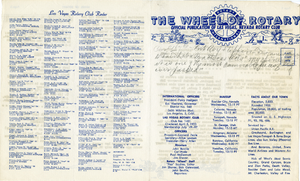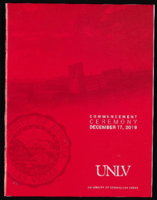Search the Special Collections and Archives Portal
Search Results
Beverly Rogers Collection of Armed Services Editions
Identifier
Abstract
The Beverly Rogers Collection of Armed Services Editions includes one thousand two hundred and seventy-nine of the original paperback Armed Services Edition titles published between 1943 and 1947 used by World War II service members in the United States Army and Navy, as well as four editions from the Legacy Project published in 2003 and one from the Pocket Books Inc. series published in 1944. The original Armed Services Editions include works of fiction and non-fiction in their unabridged forms.
Archival Collection
Fort Mojave Indian School Records
Identifier
Abstract
The Fort Mojave Indian School Records (1890-1923) consist of correspondence, finance and administrative records, pump station blueprints, and policy implementation and fact finding records. The school served the Hualapai and Mojave Indians at a site near present-day Kingman, Arizona. The information is contained in two bound volumes.
Archival Collection

The Wheel of Rotary Las Vegas Rotary Club newsletter, November 17, 1949
Date
Archival Collection
Description
Text

University of Nevada, Las Vegas (UNLV) Fall 2019 commencement program
Date
Archival Collection
Description
Commencement program from University of Nevada, Las Vegas Commencement Programs and Graduation Lists (UA-00115).
Text

Arsya Respati oral history interview: transcript
Date
Archival Collection
Description
Oral history interview with Arsya Respati conducted by Madison Chang on December 4, 2021 for Reflections: The Las Vegas Asian American and Pacific Islander Oral History Project. University of Nevada, Las Vegas (UNLV) student Arsya Respati shares his childhood and upbringing in Jakarta, Indonesia and educational background. He discusses his studies at the international BINUS SCHOOL Simprug in Jakarta and his immigration to the United States with his younger brother to pursue the culinary arts at the William F. Harrah College of Hospitality at UNLV. Arsya Respati talks about his relationship with his parents and their daily communication, his "aunty" who has helped him adjust to American culture and homesickness, his Muslim faith and traditions, and his employment. He also shares his views on Indonesian politics and cultural diversity, and the diversity of Las Vegas.
Text

Daniel A. Moore interview, March 3, 1979: transcript
Date
Archival Collection
Description
On March 3, 1979, Norwood Germany Jr. interviewed Daniel A. Moore (b. 1939 in Fort Worth, Texas) about his life in Las Vegas, Nevada. Moore begins by speaking about his move to Las Vegas from Utah at a young age, his education and his work in construction and at the Las Vegas McCarran Airport. Moreover, Moore speaks about his involvement with church and his recreational hobbies such as bowling. Moore also spends time speaking about the African American population in Las Vegas, the jobs available to them, racial tensions in his young adulthood versus his children’s experiences, and the segregation of black communities into the Las Vegas Westside. Lastly, he talks about the city’s growth, tourism and the economy, the development of different shopping centers and malls, and the city’s law enforcement.
Text

Miguel Villarba oral history interview: transcript
Date
Archival Collection
Description
Oral history interview with Miguel Villarba conducted by David Islas on December 6, 2021 for Reflections: The Las Vegas Asian American and Pacific Islander Oral History Project. In this interview, Miguel Villarba shares his family's history growing up in Manila, Philippines and immigrating to the United States in 2016. He talks about first living in Chattanooga, Tennessee before moving to Las Vegas, Nevada to be near family when Miguel was in high school. Miguel Villarba shares stories of his grandfather's farm in Pangasinan, Philippines, the differences in city and town life across Manila, Chattanooga, and Las Vegas, and his educational plans. He also talks about Filipino culture and traditions, and racial discrimination.
Text

Lillian Morrison interview, 1996: transcript
Date
Archival Collection
Description
Lillian Morrison was the first uniformed female who worked for Park Service and has worked for Reclamation for 20 years during the war at Camp Williston. Morrison recalls life in Boulder City during the late 1930s and 1940s. Morrison is the wife of Lloyd Shorty Morrison.
Text

Transcript of interview with Mazie Martin Jones by Jane P. Kowalewski, November 3, 1978
Date
Archival Collection
Description
On November 3, 1978, Jane P. Kowalewski interviewed Mazie Martin Jones (born in Las Vegas, Nevada) about her father, Doctor Roy Martin, the first doctor to own a private practice in Las Vegas. Jones explains how her father first arrived in Nevada and his different investments in real estate, hospitals, and hotels. She goes on to explain her father’s hotel pursuits after retiring from medicine in the late forties.
Text

Transcript of interview with Ruth and Jake Dieleman by James M. Greene, November 15, 1974
Date
Archival Collection
Description
On November 15, 1974, James M. Greene interviewed Ruth Dieleman (born 1908 in Searchlight, Nevada) and her husband Jake Dieleman (born 1904 in Axel, Netherlands) about their lives in Southern Nevada. Ruth first talks about her life in Searchlight while growing up, her experience as an educator, and her various residences in Southern Nevada. Jake first talks about his immigration into the United States and his eventual move to Nevada to get into construction rigging for the building of Hoover Dam. He discusses his work as a rigger in detail but also discusses his work on various Las Vegas casinos as well as his work in the state legislature.
Text
